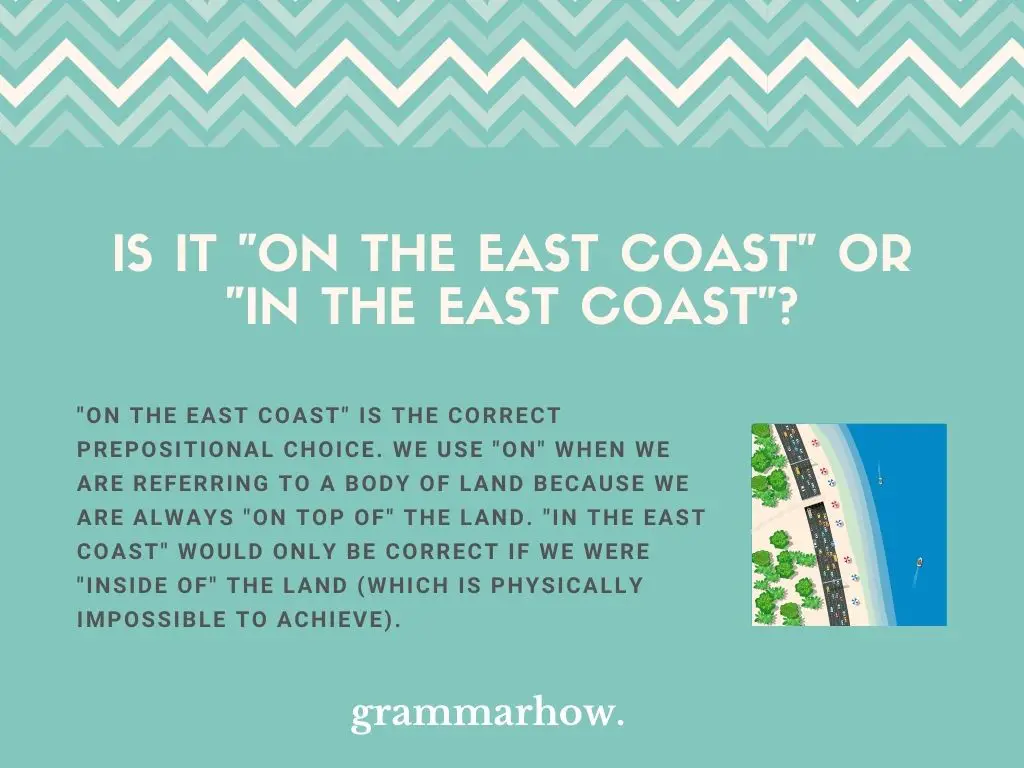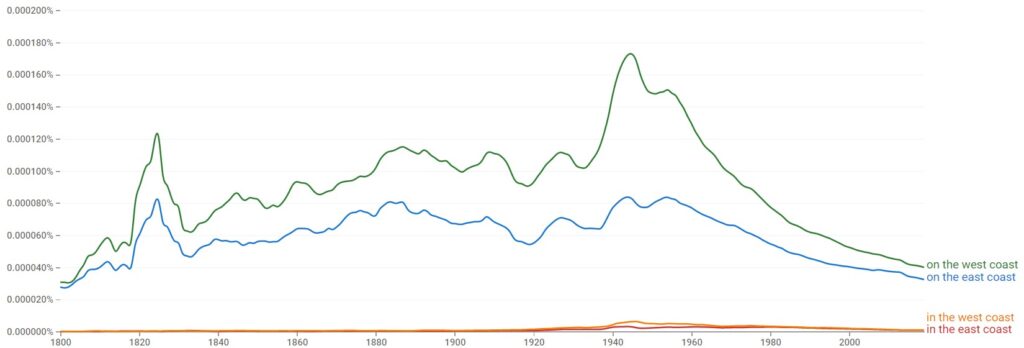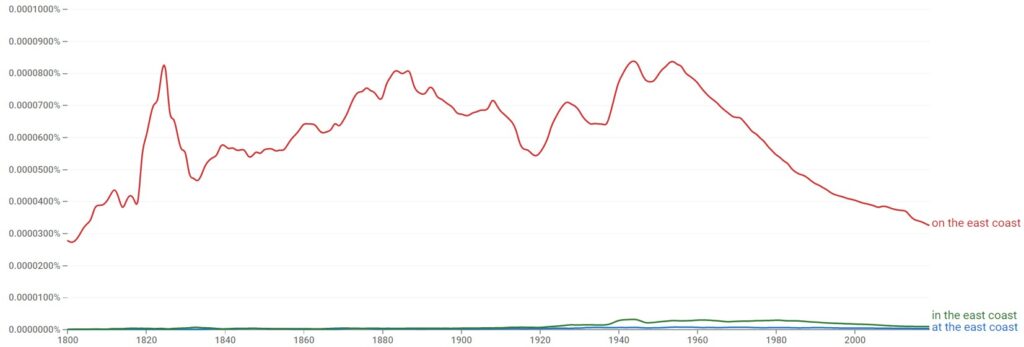Prepositions like “in” and “on” are some of the shortest words in English. However, they can also be some of the more complicated ones to get right if you don’t know where they belong. This article will look at using both of them alongside “the east coast” to help you.
Is It “ON The East Coast” Or “IN The East Coast”?
“On the east coast” is the correct prepositional choice. We use “on” when we are referring to a body of land because we are always “on top of” the land. “In the east coast” would only be correct if we were “inside of” the land (which is physically impossible to achieve).

The differences between “on” and “in” come down to nuances in English. While they are subtle differences, you have to make sure you know what they mean.
“On” always implies that we are above something, while “in” always implies that we are inside of something. Naturally, it’s impossible to grow up “in” a piece of land, just like it’s impossible to grow up “on” a city (because you live inside a city).
The more familiar you get with certain structures in English, the better off you’ll be understanding these prepositional differences.
Is It “ON The West Coast” Or “IN The West Coast”?
The direction of the “coast” does not change the prepositional use. “On the west coast” is correct because “coast” is the modifier that determines which preposition we should use. “In the west coast” would still imply that someone is “inside” of the coastal land.
We cannot afford to make exceptions when using “on” and “in” here. While there are other English rules that might affect other phrases, the idea of being “on” or “in” a piece of land is definitive.
That means “in the west coast” is always wrong in all cases. No native speaker will use this phrasal form if they know about the grammatical rules.
Examples Of How To Use “On The East/West Coast” And “In The East/West Coast” In A Sentence
It might help if we went through a few more examples of each case. There are no exceptions to the rules we’ve stated, and these examples will prove that.
- Correct: I grew up on the west coast, and I always found myself having a blast while I was there.
- Incorrect: She was in the west coast the last time I checked, though I haven’t contacted her about it for many months.
- Correct: I live on the east coast, but I’m thinking about moving inwards to be closer to my family.
- Incorrect: You should be in the east coast. You have the attitude of a surfer, and I think you’d really love it.
- Correct: I would like to be on the west coast right now! I’m sure I’d be having so much fun soaking in the sun!
- Incorrect: I grew up in the west coast. It wasn’t the most enjoyable experience for me, which is why I moved away.
- Correct: I’m currently on the east coast, though there are a few legal reasons why I think it’s time for me to move away.
- Incorrect: You should be in the east coast with me! I think it’s where you need to be!
“On” is the only correct prepositional choice for both “east coast” and “west coast.” Remember the preposition is based on the land known as the “coast,” which is why “in” can never be the correct choice.
How Prevalent Is The Use Of “On The East/West Coast” And “In The East/West Coast”?
Some statistics are always welcomed at this point in the article. After all, they usually help us to prove our point about the prepositional choices between the two phrases.
According to Google Ngram Viewer, “on the east coast” and “on the west coast” are the only appropriate spellings. It’s made clear by the fact that neither option with “in” makes it off the starting line.

So, native speakers already accept that “on” is the only suitable choice for a preposition. You must remember to stick to this as well if you want to write correctly.
Is It “In The East” Or “On The East”?
What happens when we remove “coast” from the phrase, though? We’ve already stated that “coast” plays a large part in the prepositional choice. Let’s see what happens when we take it away.
“In the east” means that someone lives inside a city or country in the east of the world. “On the east” is correct as a phrase, but it always requires another noun after “east” that is related to a piece of land (like “coast”).
As you can see, “in” is now an acceptable choice. The same rules also apply when looking at “in the west.”
- I live in the east.
- I grew up in the west.
If we do want to be more specific, then our choice of preposition is entirely based on what word comes after “east” or “west.”
To help you understand it, here are some different choices:
- I live on the east coast.
- I live in the east city.
- I live on the west shore.
- I live in the west country.
“On” applies when we are referencing a specific piece of land like a “coast” or “shore.” “In” applies when we are referencing a place where someone can be “inside of,” which applies to “cities” and “countries.”
Is It Ever Correct To Use “At The East Coast” And “At The West Coast”?
There is one last prepositional choice that we would like to go through. We have yet to touch on “at,” but there’s a very good reason for that.
“At the east coast” and “at the west coast” are never correct. “At” is a different prepositional choice, but it is still an incorrect one. Only “on” makes sense in this context.
According to Google Ngram Viewer, “at the east coast” is even less popular than using the preposition “in.” Therefore, there is never a correct reason to use “at” as a prepositional choice for these two phrases.

